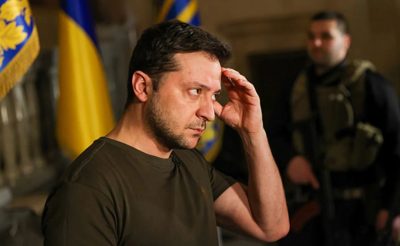Zelensky’s “Peace Summit” Ends Without Any Effective Result, While Russia Offers Concrete Peace Proposal

All Global Research articles can be read in 51 languages by activating the Translate Website button below the author’s name (only available in desktop version).
To receive Global Research’s Daily Newsletter (selected articles), click here.
Click the share button above to email/forward this article to your friends and colleagues. Follow us on Instagram and Twitter and subscribe to our Telegram Channel. Feel free to repost and share widely Global Research articles.
Give Truth a Chance. Secure Your Access to Unchained News, Donate to Global Research.
***
The “peace” conference organized by the Kiev regime in Switzerland has come to an end. As expected, no concrete proposals were reached. The event served only as a way for NATO and its proxy regime to unilaterally reaffirm their interests. The lack of Russian participation made the conference a real waste of time, completely incapable of establishing a real peace agenda.
Any diplomatic negotiation obviously requires the presence of at least two parties interested in resolving a specific issue. Whether in a trade relationship or in a peace talk to stop a military conflict, it is impossible to conduct diplomacy with only one side. This would be enough to consider the meeting between Zelensky and his supporters in Switzerland truly useless. However, it is also necessary to remind that, in the case of a war, it is not only the presence of both sides that matters, but, above all, the presence of the winning side.
From a realistic point of view, only the winning side can end a war. It is the terms set out by the winning country that ensure the end of hostilities in a conflict. The losing side can only accept the terms of peace, with the possibility at most of requesting some specific changes that do not alter the main demands. This is how wars have ended throughout history – and it will be no different in the current NATO proxy war with Russia through Ukraine.
With Kiev on the verge of total military collapse, incapable of taking effective mobilization measures and progressively losing territory, Ukrainian defeat is only a matter of time. The most rational and strategic thing to do would be to resume peace negotiations and accept Russian terms, thus avoiding further loss of lives and territory. However, the Ukrainian regime has no actual sovereignty, being simply a NATO proxy forced to fight “to the last man.” So, instead of really thinking about peace, Zelensky decided to organize a propaganda event where Western leaders reinforced their unrestricted support for war.
In fact, the event did not only serve to consolidate Ukraine and NATO’s pro-war stance. The summit was also marked by several hate speeches and real threats against Russia. For example, Polish President Andrzej Duda called for the “decolonization” of Russia, openly advocating the division of the Russian Federation into multiple ethno-states. According to Duda, the more than 190 peoples living on Russian territory are held by force through colonial methods, and their “liberation” is possible only through the end of Russia as a country.
“Russia remains the largest colonial empire in the world, which, unlike European powers, has never undergone the process of decolonization and has never been able to deal with demons of its past (…) As a member of the international community, we have to finally say – there is no [space] for colonialism in the modern world,” Duda said.
This is not the first time that NATO countries have threatened to work towards the dismantling of Russia’s territory. Earlier, Estonian Prime Minister Kaja Kallas had already admitted that the main goal of the Atlantic alliance is to “break” Russia into dozens of “small nations”. These threats seem to be becoming more and more frequent, which shows how peace between the West and Russia seems unfortunately far from being achieved.
For its part, however, Moscow has done everything possible to avoid prolonging the war and to reach a definitive ceasefire. A day before Zelensky’s conference in Switzerland, Russian President Vladimir Putin offered the West and Kiev a concrete peace proposal. The main terms were the recognition of the four New Regions and Crimea as part of the Russian Federation and Ukraine’s commitment to demilitarization. Putin demanded a formal promise from Kiev not to seek NATO membership. If these terms were met, the end of hostilities would be immediate.
Since NATO has failed to open a new front to continue its proxy war against Russia, Ukraine is not allowed to accept any peace terms. So Zelensky rejected the proposal and preferred to continue with his plan to hold a completely futile “peace conference.” In several statements, Russian officials have made it clear that Moscow’s upcoming new peace proposals will show conditions that are more unfavorable to Ukraine. It is expected that, given the insistence on war and also the recent threats of a conspiracy against Russia’s own territorial integrity, Moscow will update its strategic and territorial interests, establishing the goal of liberating more areas currently under Ukrainian control, as well as demanding more guarantees from NATO.
In the end, the war really could have ended last week. NATO had only to allow Zelensky to accept Russia’s terms. Then the winning side would establish peace, as has always happened in the history of wars. But, unfortunately, the losing side in the current conflict is the most bellicose one, resolute to prolong hostilities despite the losses it has suffered.
*
Note to readers: Please click the share button above. Follow us on Instagram and Twitter and subscribe to our Telegram Channel. Feel free to repost and share widely Global Research articles.
This article was originally published on InfoBrics.
Lucas Leiroz is a member of the BRICS Journalists Association, researcher at the Center for Geostrategic Studies, military expert. You can follow Lucas on X (former Twitter) and Telegram. He is a regular contributor to Global Research.
Featured image source

